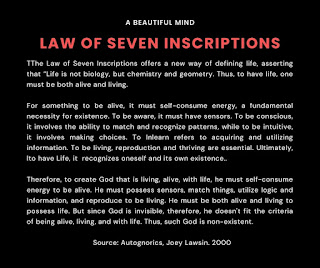The First Being Argument, as proposed by Joey Lawsin in his book Originemology, presents a philosophical challenge to the existence of God. This argument posits that all things in existence have a starting point, suggesting that nothing can exist without having been initiated at some moment in time. Additionally, it asserts that everything exists due to the influence or causation of other entities or events, highlighting a continuous chain of causality.
Moreover, the argument emphasizes the role of the external environment in the creation of beginnings. According to this view, the environment plays a crucial part in facilitating the emergence of new entities and phenomena, indicating that creation is a process deeply influenced by external conditions. Lastly, the argument introduces the concept of inherent inscriptions, which refers to the idea that every existence comes with a set of embedded instructions
This argument is rooted in the Caveman in the Box Troika, which outlines several key principles. Firstly, it posits that everything has a beginning, implying that nothing can exist without having been initiated at some point in time. Secondly, it suggests that all things exist because they are caused by other entities or events, emphasizing a chain of causality that underpins existence.
Furthermore, the argument highlights the role of the environment in the process of creation. According to this view, the environment is a crucial factor that facilitates the emergence of new entities and phenomena. This principle underscores the interconnectedness of all things and the idea that creation is not an isolated event but a continuous process influenced by external conditions. Lastly, the argument introduces the concept of inscription, which implies that for something to exist, it must be inscribed or recorded in some manner. This could be interpreted as a form of documentation or recognition that validates the existence of an entity.
In summary, the First Being Argument challenges the traditional notion of a divine creator by emphasizing the principles of beginnings, causality, environmental influence, and inherent inscriptions. It suggests that the existence of everything can be explained through natural processes and interactions rather than attributing it to a supernatural being.
The basic form of the argument is as follows:
- All entities in existence have an initiation point, implying that they cannot exist without having been initiated at some moment in time.
- Every entity exists due to the causative influence of other entities or events, forming a continuous chain of causality.
- The external environment plays a critical role in the genesis of new entities and phenomena, indicating that creation is a process heavily influenced by materials and instructions.
- The concept of inherent inscriptions suggests that each entity possesses embedded instructions or inscription by design that validate its existence.
This argument posits that the natural processes and environmental conditions that lead to the emergence of new entities challenge the necessity of a divine creator.
Joey Lawsin's "Caveman in the Box" hypothesis is a thought-provoking exploration into the origins of information and consciousness. This hypothesis is part of Lawsin's broader field of study known as Originemology, which examines the origin, creation, and evolution of information.
The "Caveman in the Box" hypothesis presents three scenarios of isolation to explore how information might emerge in the minds of early humans. The first scenario involves a baby boy born to a caveman and placed in a high-tech, intuitive room immediately after birth. This room provides all the necessities for life and growth but isolates the boy from any external human interaction. The second scenario features the first human on Earth, isolated from birth to adulthood in the natural world, surrounded by plants, animals, and other non-human entities. The third scenario involves a four-legged creature, a dog, isolated in the same manner as the caveman but with the added complexity of being a different species².
Lawsin's hypothesis raises fundamental questions about the nature of information and its origins. He asks whether the source of information is a "who" or a "what," pondering whether it could be attributed to a divine being, extraterrestrial entities, or some other unknown source. This line of inquiry challenges traditional notions of how knowledge and consciousness develop, suggesting that isolation and the environment play crucial roles in shaping the mind².
The "Caveman in the Box" hypothesis also touches on the philosophical implications of information theory. By isolating individuals from birth, Lawsin aims to understand how information is internalized and processed without external influences. This thought experiment highlights the importance of interaction and communication in the development of consciousness and knowledge. It suggests that without external stimuli, the mind might develop differently, potentially lacking the richness and complexity that comes from social and environmental interactions².
In conclusion, Joey Lawsin's "Caveman in the Box" hypothesis offers a unique perspective on the origins of information and consciousness. By examining scenarios of isolation, Lawsin challenges us to rethink how knowledge is acquired and the role of external influences in shaping the human mind. This hypothesis not only contributes to the field of Originemology but also provides valuable insights into the fundamental nature of information and its impact on human development.
"Everything exists because other things cause it to exist." ~ Joey Lawsin





















.png)




